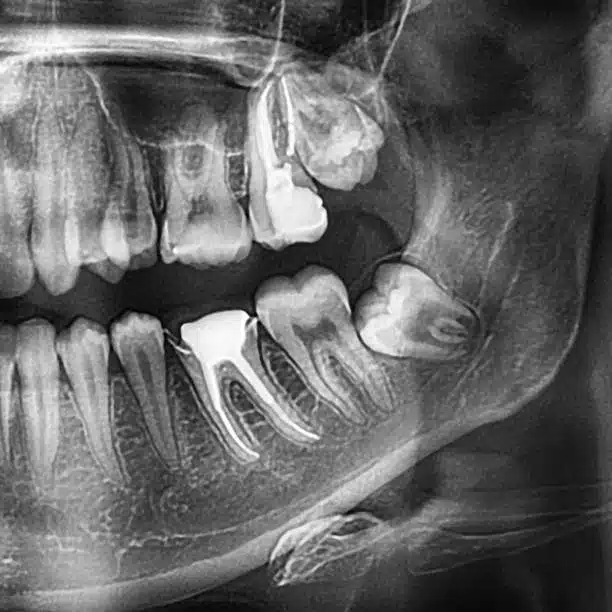
Did you know the human mouth comprises 32 teeth, each serving specific functions? Among these are eight incisors, four canines, eight premolars, and 12 molars, including wisdom teeth.
Our wisdom teeth, referred to as our third molars, are the final teeth at the back of your mouth. Unlike other teeth, they usually erupt during late adolescence or early adulthood, typically between the ages of 17 and 21. Most adults have four wisdom teeth, two located at the top and two at the bottom sides of the jaw.
Their emergence may oftentimes lead to the need for wisdom tooth extraction. Fortunately, in Singapore, such procedures are often facilitated by Medisave.
The following signs and symptoms may indicate your need for wisdom tooth extraction:
Wisdom tooth extraction can be categorised into two types based on the case’s complexity. Understanding these methods is key to preparing for what to expect during your visit to a dental clinic for the extraction.
Whether your procedure qualifies for MediSave claims can also depend on the type of extraction performed. Simple extractions are typically straightforward, while surgical extractions may involve a more complex process often referred to as wisdom tooth surgery.
The procedure for wisdom tooth extraction typically involves several stages to ensure a safe outcome:
During the initial consultation, the dental specialist will conduct an assessment to evaluate the condition and position of your wisdom teeth. Based on the assessment, they will personalise your wisdom tooth extraction plan and explain the purpose and risks of the recommended procedure.
Before any wisdom tooth extraction procedures, you will be anaesthetised in one of two ways: local anaesthesia or sedation. Local anaesthesia will numb the extraction site, helping you to stay conscious during the procedure. On the other hand, intravenous sedation will help you stay unconscious during the surgery.
Depending on your treatment plan, the wisdom tooth extraction procedure may involve a minor incision if the wisdom tooth is positioned beneath the gum line. The gum tissue will be lifted to access the tooth, and if necessary, the tooth may be sectioned for removal. After the tooth is extracted, the area will be sterilised, and the gums will be stitched back together.
Following the procedure, adhering to proper post-operative care is essential for healing and recovery. Minor bleeding from the extraction site is normal and can be controlled by biting on a gauze pad. Painkillers, antibiotics, and antiseptic mouthwash may be prescribed to prevent complications.
As with any other surgical procedure, a wisdom tooth extraction may have risks. It’s crucial that you discuss these potential risks with your dental specialist to ensure a clear understanding before proceeding with the extraction.
Managing pain and discomfort after wisdom tooth surgery is crucial for a smooth recovery. While it is common to experience some level of discomfort post-surgery, this typically subsides within a few days. To help manage the pain, the dental specialist may recommend:
If pain persists longer than expected or worsens, contact your dental clinic promptly. Persistent or escalating pain could indicate a complication, such as an infection or dry socket, which requires immediate attention.
MediSave can be used to cover a portion of the surgical expenses for the wisdom tooth extraction. It is important to note that MediSave claims are applicable for surgical procedures such as wisdom tooth surgery, fractured retained root removals, and dental implants but not for simple extractions. Therefore, if you are planning to undergo surgery, you can utilise your MediSave claims to offset the cost of the procedure partially.
To find out whether you are a good candidate, schedule an appointment with our dental clinician for
an initial consultation. Once the assessment of your dental health is done, our clinician will work with
you to develop a treatment plan that is right for you.
Yes, the CHAS Dental Subsidy scheme covers wisdom tooth extractions. However, it’s important to note that the coverage and subsidy amounts may vary depending on the specific treatment required. Please contact the dental clinic to understand the specific details of this subsidy coverage.
If your wisdom teeth are already causing issues and have yet to be removed, they can lead to various complications. These include overcrowding of the teeth, increased risk of tooth decay and gum disease, cyst formation, jaw pain, and potential damage to adjacent teeth.
Preparing for wisdom teeth removal involves a few steps to help ensure a smooth procedure and recovery. It is advisable to follow the dentist’s instructions, which may include arranging for someone to drive you home and taking any prescribed medications as directed. Understanding the pre-operative guidelines is also essential for a smooth experience.
Your wisdom tooth surgery may not be painful as you will be anaesthetised before the procedure. However, it is common to experience discomfort at the extraction site after the anaesthetic has worn off. The pain typically lasts two to three days, but soreness and more complex cases or multiple extractions may require seven to 10 days.
After your wisdom tooth surgery, it’s normal to experience some bleeding for the first 24 hours. Utilising the gauze pad provided by the dentist and applying gentle pressure will help manage this. If bleeding persists or becomes heavy, it’s essential to contact your dentist. Remember, following your dentist’s advice is key to a smooth recovery.
Yes, maintaining oral hygiene is crucial after your wisdom TOOTH extraction. However, be gentle around the surgery site to avoid dislodging the blood clot. Brush your teeth softly using a soft-bristled brush, avoiding the extraction area for the first 24 hours. This will help to prevent infection and promote healing.
The healing time for wisdom tooth surgery varies. Swelling often improves within two to three days, enabling you to resume your daily activities. If you experience jaw tightness or if your extraction procedure is complex and involves multiple teeth, seven to 10 days are required. You will typically recover from any mild bruising within two weeks.
The duration of wisdom teeth extraction varies depending on the case’s complexity. Non-surgical extractions generally take around 30 minutes per tooth, while surgical procedures can range from 30 to 60 minutes per tooth. The exact time required for the surgery will be determined by the specific circumstances and requirements of each individual.
After removing your wisdom teeth, it is advisable to consume a soft food diet for the initial days of recovery. You can gradually introduce solid foods as tolerated. However, it’s important to avoid hot, spicy, and hard foods that can irritate the extraction site. You are recommended to follow the dentist’s advice for a smooth recovery.
Wisdom tooth pain may arise from various factors, potentially due to their position as the last set of molars to emerge. Key contributors include:
Regular dental check-ups and timely interventions can help manage these various aspects of wisdom tooth pain. Understanding these pain sources also helps address the discomfort associated with wisdom teeth.

Since its inception in 2003, Family Dental Centre (FDC) has grown into a network of dental clinics in Singapore, driven by the mission to provide quality and accessible dental care to the community. As part of the Oracare Group and recognised by both the Singapore Medical Council and the Ministry of Health, our focus is on upholding high standards in dental services, a commitment that has led to our inclusion in Dental Asia and listing on HealthHub, Singapore’s leading health portal.
At FDC, understanding and meeting the individual needs of our patients is at the heart of what we do. Our expansion to multiple conveniently located clinics is a reflection of our commitment to making dental care accessible to all, supported by a team of 32 dental surgeons. Continuous professional development is key, ensuring our team is equipped to provide tailored, high-quality care. In recognition of Singapore’s diverse culture and languages, our staff are conversant in English, Mandarin, and Malay, facilitating clear and effective communication with our wide-ranging clientele.
Choosing Family Dental Centre means opting for a partner committed to your long-term dental health. Learn more about FDC and discover how we can be part of your dental care journey.
Menu
Services
Preventive Dentistry
Restorative Dentistry
Cosmetic & Aesthetic
Dentistry
Teeth Aligners &
Straightening
Why Us